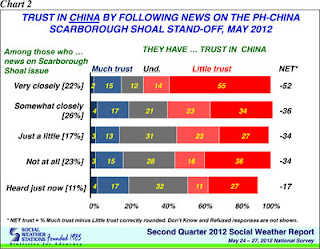People' s trust to China has continue declining to its lowest phase of -36 in the wake of the Scarborough Shoal standoff in the West Philippines Sea (South China Sea), the Social Weather Stations (SWS) said in a new report as posted in the Business World Online.
A May 24-27 2012, survey found 55% of the respondents saying they had "little trust" in China, versus the 19% who said they had "much trust", for a "bad" net rating of -36.
The last time this level was hit was in June 1995 during the Mischief Reef incident, one of a number of spats in the country's long-running row with China over conflicting South China Sea claims.
A few months earlier, in March, China's net trust rating among Filipinos was at a "moderate" +10 (39% "much trust", 29% "little trust").
Nearly half, or 48%, of the respondents also claimed to be paying close attention to the row, which started early April when eight Chinese fishing boats were caught carrying fish, corals and other endangered species in the disputed area.
The SWS said China's net trust rating among Filipinos has been mostly negative -- ranging from a "neutral" -1 to the record -36 low -- since 1994. It was positive in only seven out of 24 quarters, peaking at a "moderate" +17 in June 2010.
Significant drops were recorded in June 1999 -- a "bad" -32 -- during another Mischief Reef incident and in December 2008 -- a "bad" -33 -- following news of melamine-contaminated milk from China.
The SWS said the Scarborough Shoal issue was the fourth most followed by respondents during the May poll period, behind the impeachment trial of then Supreme Court Chief Justice Renato C. Corona (54%), the Maguindanao massacre trial (50%) and the Supreme Court decision to distribute Hacienda Luisita to farmers (50%).
It said China's net trust rating was particularly low among those who were closely monitoring the dispute, at a "very bad" -52, compared to the "bad" -36, -34 and -34, respectively, among those who were following the news "somewhat closely," "just a little" and "not at all."
Representatives of the Chinese embassy in the Philippines could not be reached for comment.
Raul S. Hernandez, Foreign Affairs department spokesman, declined to comment on the SWS survey but said the government was committed to "pushing for a peaceful, diplomatic solution to issues on West Philippine Sea in accordance to international laws, particularly UNCLOS (UN Convention on the Law of the Sea)."
China was not the only Asian country distrusted by Filipinos, with the SWS saying North Korea also had a "bad" net rating of -34 (53% "little trust" and 19% "much trust").
High public trust, meanwhile, is enjoyed by the United States -- which has taken the side of the Philippines, Australia and Japan, at a "very good" +62, "good" +39 and "good" +32, respectively, in the latest poll.
The SWS considers net trust ratings of +70 and above as "excellent"; +50 to +69, "very good"; +30 to +49, "good"; +10 to +29, "moderate"; +9 to -9, "neutral"; -10 to -29, "poor"; -30 to -49, "bad"; -50 to -69, "very bad"; and -70 and below, "execrable."
The May 24-27 survey involved face-to-face interviews of 1,200 adults nationwide. The error margins used were ±3% for national and ±6% for area percentages.
BusinessWorld Online

















